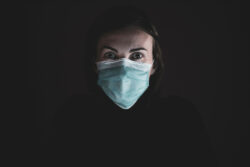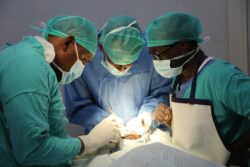Shocking Rise in Vulvar Cancer Cases
The increasing incidence of vulvar cancer, predominantly caused by the Human papillomavirus (HPV), presents a concerning health issue. The lack of prevention and screening information adds to its severity. This article explores the alarming rise in vulvar cancer cases, their causes, the importance of early detection, available treatment options, and coping strategies, with the aim of raising awareness and promoting effective prevention strategies.

Key Takeaways
- Vulvar cancer cases are increasing, despite an overall decline in cancer incidence.
- High-risk strains of HPV and lifestyle choices are emerging as risk factors for vulvar cancer.
- Regular health check-ups and HPV vaccinations are crucial for preventing vulvar cancer.
- More investments in vulvar cancer research and public health initiatives are necessary to address this alarming rise.
Understanding the Basics of Vulvar Cancer
The basics of vulvar cancer begin with understanding that it is a type of malignancy that forms gradually over many years, most commonly on the vaginal lips or the sides of the vaginal opening. One of the primary risk factors for vulvar cancer is infection with the human papillomavirus (HPV). Age, smoking, and a weakened immune system are also significant risk factors. The symptoms and signs of vulvar cancer can vary, but they often include persistent itching, pain or tenderness, changes in skin color or thickness, and the formation of a lump or ulcer. Most importantly, early detection through regular examination and reporting of any unusual symptoms to a healthcare professional can greatly increase the chances of successful treatment.
The Alarming Increase in Vulvar Cancer Cases
While the overall incidence of many cancers has been declining or stabilizing in recent years, there has been a disturbing increase in the number of vulvar cancer cases, demonstrating a pressing need for enhanced awareness and preventative measures. This alarming surge, highlighted in current vulvar cancer research, points towards a plethora of emerging risk factors, such as high-risk strains of HPV and lifestyle choices. The growing prevalence of this disease indicates an urgent necessity for more comprehensive studies and early detection strategies. These findings serve as a grim reminder of the importance of regular health check-ups and HPV vaccinations, underscoring the critical need for further investments in vulvar cancer research and public health initiatives.
Unpacking the Causes of Vulvar Cancer
In light of the recent surge in vulvar cancer cases, it is crucial to delve into the potential causes of this disease, which range from genetic predisposition to exposure to high-risk strains of the Human Papillomavirus (HPV). A genetic predisposition, while not the sole cause, can significantly increase one's vulnerability to developing vulvar cancer. Meanwhile, HPV, particularly high-risk strains, plays a crucial role in a substantial number of cases. The HPV vaccination is a powerful preventive measure, reducing the risk of infection from these high-risk strains and subsequently mitigating the likelihood of developing vulvar cancer. Understanding these causes is the first step towards effective prevention and early detection, contributing to the fight against this growing health concern.
Importance of Early Detection and Screening Methods
Given the alarming rise in vulvar cancer cases, it becomes paramount to underscore the significance of early detection and efficient screening methods in mitigating the severity of this disease. Early detection methods involve regular gynecological exams, understanding personal risk factors, and being attentive to symptoms such as persistent itching, burning, or bleeding in the vulvar area.
Screening guidelines, though not currently established by the National Cancer Institute, involve the HPV vaccination and regular Pap tests for women at risk. These preventative measures can potentially detect precancerous conditions, thus enabling early treatment. The importance of these methods cannot be overstressed, as early detection enhances treatment effectiveness, improving survival rates and quality of life for patients.
Treatment Options for Vulvar Cancer
When diagnosed with vulvar cancer, a patient must weigh up various treatment options, which typically include surgery, radiation therapy, and chemotherapy, depending on the stage and location of the cancer. In some cases, laser therapy might be an option. This non-invasive procedure uses high-intensity light to destroy cancer cells, often with fewer side effects than other treatments. Drug therapy, another alternative, uses powerful medicines to kill cancer cells or stop them from growing. This may involve chemotherapy drugs, or targeted therapies that focus on specific abnormalities within the cancer cells. The choice of treatment is a complex decision, influenced by the patient's overall health, the type and stage of the cancer, and the potential side effects of each treatment.
Managing Life Post-Diagnosis: Coping Strategies and Support Systems
Both the physical and emotional challenges of a vulvar cancer diagnosis can be overwhelming, but with the right coping strategies and a strong support system, many patients find they are able to navigate this difficult journey more effectively. It is important to reach out to counseling resources that provide professional guidance to deal with the mental stress and anxiety that often accompanies such a diagnosis. These resources can provide invaluable tools and strategies for managing fear, anger, and despair. Additionally, drawing strength from survivor stories can be incredibly empowering. These personal narratives not only offer hope but also practical advice on dealing with side effects, maintaining relationships, and advocating for oneself in the healthcare system. The road to recovery may be hard, but it needn't be traveled alone.
Frequently Asked Questions
What Research Is Currently Being Conducted on New Treatments for Vulvar Cancer?
Current research is focusing on understanding genetic predispositions that may contribute to vulvar cancer. This understanding could lead to more precise diagnostic and treatment options. Additionally, advancements in immunotherapy are being explored, targeting the body's immune response to fight the disease. These studies involve the use of drugs that enhance the immune system's ability to detect and destroy cancer cells, potentially offering a new therapeutic approach for vulvar cancer patients.
How Does Vulvar Cancer Affect Fertility and Sexual Health?
Vulvar cancer can significantly impact a woman's fertility and sexual health, potentially leading to psychological distress. Depending on the stage and treatment, fertility might be affected, causing emotional distress. Treatment costs can also contribute to mental stress. Moreover, the disease and its treatment may cause physical changes, influencing sexual health and self-image. Therefore, comprehensive care, including psychological support, is crucial for affected individuals.
Are There Lifestyle Changes or Habits That Could Potentially Lower the Risk of Vulvar Cancer?
Implementing lifestyle modifications may potentially mitigate the risk of vulvar cancer. Preventive vaccinations like the Human Papillomavirus (HPV) vaccine can significantly lower the risk. Furthermore, maintaining a healthy diet can help boost the immune system, potentially reducing vulnerability to HPV infections. It's also beneficial to quit smoking and practice safe sex. While these lifestyle changes can't guarantee absolute prevention, they can significantly help in risk reduction.
How Can Caregivers or Loved Ones Support Someone Diagnosed With Vulvar Cancer?
Caregivers or loved ones can support someone diagnosed with vulvar cancer by providing emotional coping mechanisms such as empathy, reassurance, and open communication. They can also help in financial planning for medical costs, including treatments and medications. Offering assistance in daily tasks, coordinating with healthcare providers, and facilitating access to support groups can be beneficial. It's crucial to maintain positivity and resilience during this challenging period.
What Is the Recurrence Rate of Vulvar Cancer After Successful Treatment?
The recurrence rate of vulvar cancer after successful treatment varies based on several factors such as the stage of the cancer and the effectiveness of treatment. Survivorship challenges are significant, with potential physical and emotional impacts. Post-treatment coping strategies, such as regular follow-up care, maintaining a healthy lifestyle, and psychological support, can help manage the fear of recurrence and improve the overall quality of life for survivors.
Conclusion
In combating the alarming rise in vulvar cancer cases, the importance of understanding the disease, its causes, and available treatment options is paramount. Early detection and efficient screening methods could significantly reduce the devastating impact of this disease. Moreover, equipping patients with effective coping strategies and robust support systems post-diagnosis is vital. It is imperative that further research and awareness initiatives are accelerated to devise effective prevention strategies against this life-threatening disease.

This post has been generated by AI and was not reviewed by editors. This is Not legal advice. Please consult with an attorney.




